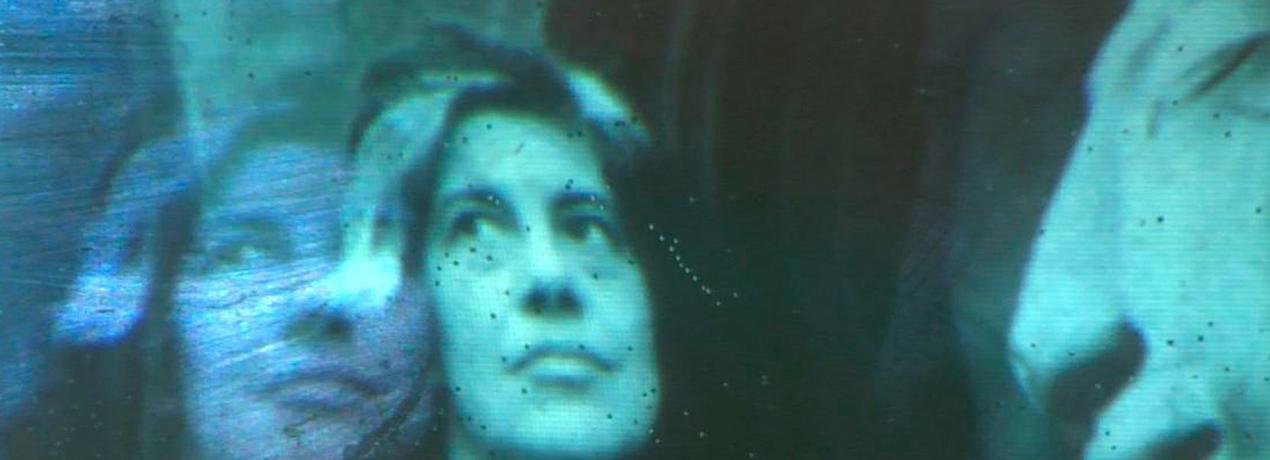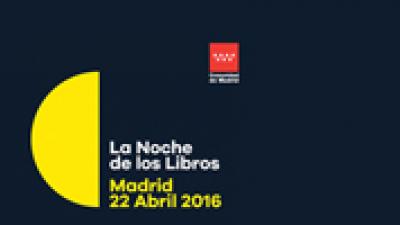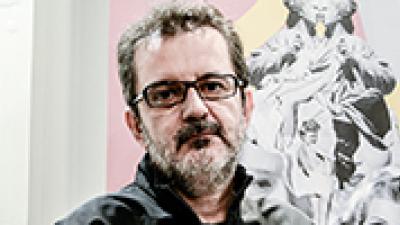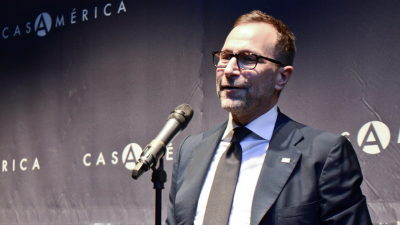Regarding Susan Sontag
Nancy D. Kates
72157666104173865
Proyección de la película Regarding Susan Sontag, de Nancy D. Kates, en el marco de las actividades de La Noche de los Libros. Presentación a cargo de Eulalia Piñero Gil, profesora titular de la Universidad Autónoma de Madrid.
Estados Unidos, 2014 / 100’ / TP / v.o.s.e.
Dirección: Nancy D. Kates.
Sinopsis: Regarding Susan Sontag es una investigación íntima y llena de matices sobre la vida de una de las pensadoras más influyentes y provocadoras del siglo XX. Apasionada, muy directa y llena de elegancia durante toda su carrera, Susan Sontag se convirtió en uno de los iconos literarios, políticos y feministas más importantes de su generación. El documental explora la vida de Sontag a través de materiales de archivo, testimonios de amigos, familiares, colegas y amantes, así como sus propias palabras, en la voz de Patricia Clarkson. Desde su temprana pasión por los libros a su primera experiencia en un bar gay; de su precoz matrimonio hasta su último amor, el documental es una mirada fascinante a una escritora y crítica cultural imponente, cuyas obras en fotografía de la guerra, la enfermedad y el terrorismo siguen impactando hoy día.




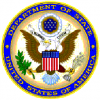






Colabora:

Dirección: Nancy D. Kates.
Producción: HBO Documentary Films, Question Why Films.
Productora: Nancy Kates.
Productor ejecutivo: Tom Dolby.
Coproductores: Rachel Antell.
Productores asociados: Arwen Curry, Susannah Patrice Morse.
Guión: Nancy Kates, John Haptas.
Fotografía: Sophia E. Constantinou.
Montaje: John Haptas.
Música: Laura Karpman, Nora Kroll-Rosenbaum.
Voz de: Susan Sontag Patricia Clark.
Nancy Kates
Es una cineasta y escritora con sede en Berkeley, California. Graduada en Stanford, su proyecto de tesis doctoral, Their Own Vietnam, recibió el Premio de la Academia Estudiantil de Documental en 1995. Trabajó como periodista en Nueva York y Boston antes de dedicarse a filmar. Co-produjo y dirigió Brother Outsider: la vida de Bayard Rustin With (2003), junto al realizador neoyorquino Bennett Singer. Brother Outsider se estrenó en el Festival de Cine de Sundance de 2003 y fue emitido a nivel nacional en el programa de television P.O.V. La película recibió numerosos premios, incluyendo el premio de los medios GLAAD 2004, y los premios del público en los principales festivales de cine gay y lésbico de América. También recibió el premio a la mejor película en el Festival de Nueva York y varios premios del jurado. Kates es exproductora de Computer Chronicles, la serie de la PBS, y ha trabajado como productora, guionista y consultora de argumento en varios proyectos documentales. Paralelamente a su trabajo como cineasta, imparte conferencias con frecuencia en escuelas, colegios y universidades.
En 2014 escribe, coproduce y dirige el documental Regarding Susan Sontag, distinguido con una mención especial del jurado al mejor documental, en el Festival de Tribeca (Estados Unidos).
Eulalia Piñero Gil
Eulalia Piñero Gil es profesora titular de la Universidad Autónoma de Madrid. Ha sido docente de universidades norteamericanas como Purdue University y Saint Louis University, y españolas como UNED, U. Complutense y U. de Castilla-La Mancha.
Su investigación se centra en la literatura norteamericana y canadiense, la literatura de mujeres y los estudios de género. Fue becada por Purdue University para estudiar literatura comparada y por el gobierno de Canadá en dos ocasiones para ser investigadora visitante en la U. de Toronto.
Es autora de más de ochenta artículos, traducciones y ediciones críticas sobre la obra de E. A. Poe, Herman Melville, Kate Chopin, Marianne Moore y Gertrude Stein. Ha coeditado los libros: Voces e imágenes de mujeres en el teatro del siglo XX. Dramaturgas anglonorteamericanas (2002), Arte y Mujer: visiones de cambio y desarrollo social (2010) y Rompiendo un mar de silencio: reflexiones interdisciplinares sobre la violencia contra las mujeres (2013).
Ha sido miembro de la junta directiva de la European Association for American Studies y es directora del Seminario de Estudios de Género del Departamento de Filología Inglesa de la UAM.
I was inspired to make a film about Susan Sontag because of my sadness at her passing. When she died in late 2004, I felt that an important voice had been silenced. Sontag fascinates in part because of her internal contradictions, as well as the way in which she mirrors divides and conflicts in the culture. She was the foremost female intellectual of her day, and refused to be reduced to her gender, but was also perfectly willing to use her beauty and sensuality to advance her career. She wrote about low culture from aº position within high culture, which was quite a radical act in the mid -1960s. Sontag stood publicly against the Vietnam War, but not against the actions of the state of Israel, at least in the 1970s. She was politically brave, but fearful about exposing her personal life; ahead of her time in many ways, and yet closeted.
A few months after her death, I found myself having an argument with a colleague about whether Sontag had been a lesbian. Neither The New York Times nor the Los Angeles Times obituaries mentioned her same – sex relationships. For the national paper of record to make such an omission seemed, to many, to be homophobic, though it was likely done with the intention of protecting her privacy.
As I walked back to my office after this conversation, the idea to make a documentary on Sontag hit me like a brick. The task was daunting, however. Sontag was fascinating, complex and difficult. For decades, I have been interested in Susan Sontag — as both thinker and icon. Sontag represents the possibility of a committed life, an intellectual life, and a life of thinking and writing not defined by educational institutions. She certainly embodied an ideal for female undergraduates of the 1970s and ‘80s: Sontag was the zenith that none could equal but many aspired to. The film also comes out of my obsession with books and writing — it is, in part, a reader’s tribute to a writer and the literary world. Publicly, Sontag was the fierce “dragon lady” of American letters; in private, she was as Confused and vulnerable as the next person. Nor did she feel free to reveal her vulnerabilities, for fear of being dismissed as weak and emotional by her fellow writers — often men with large egos. She kept her sexuality private, assuming it would be used against her, even in later years, when admirers demanded that she come out.
The film explores the contrast between the private, vulnerable Sontag and her self -assured public persona, and, above all, the ways in which Sontag did not wish to be seen. I am also interested in documenting the issues Sontag championed, and demonstrating why her ideas continue to resonate in the culture. She wrote eloquently about photography and its importance in consumer culture, calling for an “ecology” of images.
In many ways, we live in a Sontagian world of complete visual overload, a media environment dominated by the image culture of television, advertising, YouTube, Facebook and instant access to information. The film creatively uses archival materials in the effort to excavate the past, partly by creating visual metaphors for her ideas.
Regarding Susan Sontagis a deep, associative engagement with a serious subject, and one that raises more questions than it answers. We hope that those familiar with Sontag’s work will gain fresh insights into her life and legacy; the documentary is primarily intended for a broad audience, including those who are less familiar with her.
I would like the film to inspire new audiences, young people who may have never heard of her, and others with only a cursory knowledge of Sontag as a cultural figure.
Premios
Mención especial del jurado al mejor documental
Festival Internacional de Cine de Tribeca. Estados Unidos, 2014.
Gran premio del jurado al mejor documental
Festival Internacional de Cine Lésbico y Gay. Italia, 2015
Festivales
IDFA - Festival Internacional de Cine Documental. Amsterdam, Holanda. 2014. (Selección oficial)
Festival Internacional de Cine Documental. Sheffield, Reino Unido, 2014. (Selección oficial)
Festival Internacional de Cine de Jerusalem. Israel, 2014. (Selección oficial)
Festival Internacional de Cine de Seattle. Estados Unidos, 2014. (Selección oficial)
Festival LesGaiCineMad. Madrid, España, 2014. (Selección oficial)
Festival de Cine LGBT Toronto. Canadá, 2014. (Selección oficial)
OutFest Los Angeles LGBT – Festival Internacional de Cine. Estados Unidos, 2014. (Selección oficial)
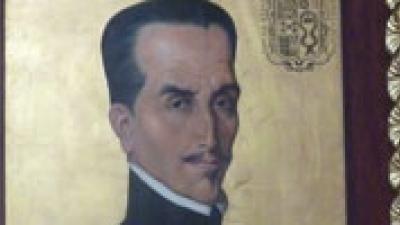
literatura
La travesía inconclusa del Inca Garcilaso de la Vega
Conferencia y concierto por La Noche de los Libros





